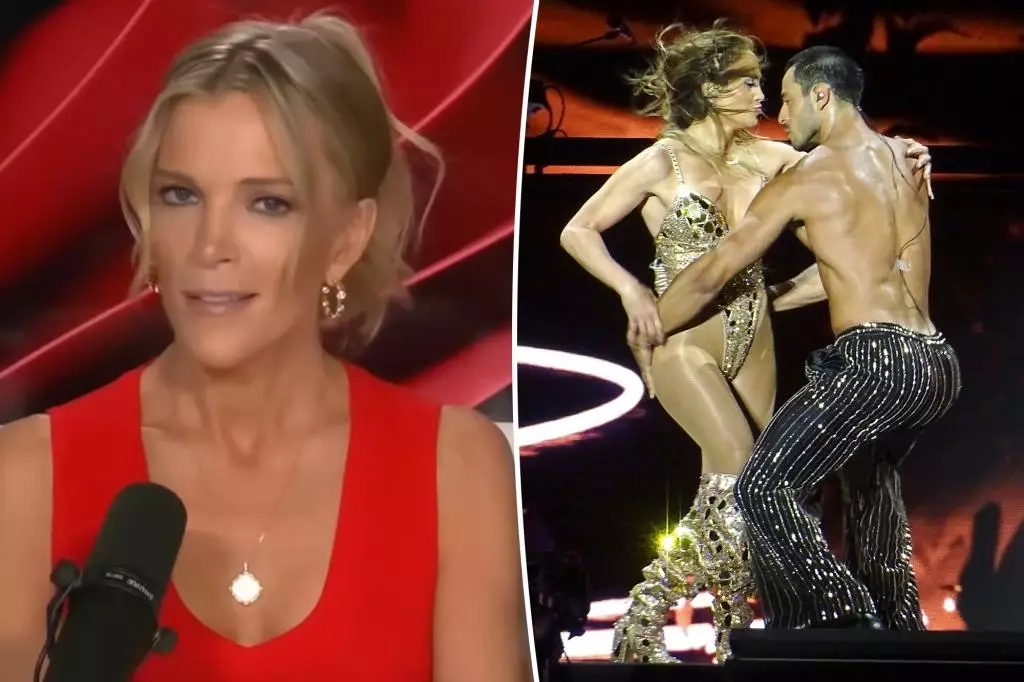Megyn Kelly’s recent critique of Jennifer Lopez exemplifies the profound influence and responsibility that comes with commenting on public figures. In an era where social media amplifies every word, Kelly’s unabashed remarks reveal not only her personal biases but also the broader societal tensions around morality, sexuality, and celebrity culture. Kelly’s harsh analogy — comparing Lopez to a “soft porn star” — underscores a tendency among some commentators to stigmatize performers who embrace sensuality, conflating empowerment with objectification. Such statements invite us to question whether honest critique is drowned out by moral grandstanding or if it exposes a latent discomfort with female sexuality that remains prevalent in certain circles.
Kelly’s attitude toward Lopez’s performance seems rooted in a traditionalist lens that punishes displays of confidence and sensuality, especially when delivered by women in the limelight. Her dismissive comments not only diminish Lopez’s artistry but also contribute to a culture that stigmatizes bold self-expression. Yet, the public backlash demonstrates that American society is increasingly polarized. While some echo Kelly’s critical stance, others defend Lopez’s right to celebrate her body and artistic freedom. The ensuing debate is a microcosm of larger cultural conflicts about gender, sexuality, and authenticity. Kelly’s comments, therefore, serve as a reminder that public discourse on celebrity often reveals more about societal values and contradictions than about the individuals involved.
Judgment and Jealousy: Analyzing the Underlying Motivations
Critics argue that Kelly’s harsh judgments may stem from a mixture of envy and insecurity. Her obsession with Lopez’s physique and stage presence appears to reflect her own discomfort with aging and sexuality. Kelly’s recent remarks about other celebrities, like Sydney Sweeney and Lauren Sánchez, further highlight a pattern of scrutinizing women’s bodies and choices through a lens of moral superiority. Such commentary reveals not just personal opinions but also a larger tendency among some media figures to perpetuate stereotypes and uphold narrow standards of femininity.
Moreover, the backlash Kelly faces underscores her vulnerability in the digital age, where no comment is immune to criticism. While she often positions herself as a fearless truth-teller, her critics see her remarks as unkind, superficial, and even petty. The debate over Lopez’s performance challenges us to ask whether celebrity critique should prioritize entertainment or empathy, and whether figures like Kelly should reflect on the potential harm of their words. Kelly’s unapologetic stance risks fueling a culture of judgment rather than understanding, which ultimately detracts from constructive dialogue on artistic expression and personal boundaries.
Broader Implications for Society and Media Responsibility
Kelly’s provocative commentary also prompts reflection on the role of media personalities in shaping cultural standards. By publicly attacking Lopez’s performance, Kelly tacitly endorses a narrow view of femininity that equates worth with youth and sexual conformity. This stance marginalizes those who challenge traditional ideals and discourages open conversations about sexuality and self-acceptance. As influencers in the digital age, media figures carry the weight of fostering either division or dialogue. Kelly’s example suggests a need for greater awareness about the power of words and the importance of advocating for a more inclusive and respectful cultural landscape.
Furthermore, the absence of Lopez’s response is telling. It signifies a confidence in her authenticity and artistic choices—traits that Kelly and her critics might do well to recognize. In a broader sense, the incident beckons society to consider whether celebrations of sexuality should be stigmatized or embraced as expressions of personal agency. The debate surrounding Kelly’s comments raises essential questions: Should criticism be rooted in respect or morality? And how can we cultivate a culture that values diversity in female expression without resorting to judgment or shame?
Ultimately, Kelly’s comments are less about Lopez and more about the societal values we uphold. They serve as a stark reminder of how public figures, whether intentionally or not, influence the collective consciousness—challenging us to examine our own biases and the standards we impose on women in the pursuit of authenticity and freedom.

Leave a Reply